新生代英语基础教程1Unit5-电子教案
- 格式:doc
- 大小:116.00 KB
- 文档页数:16
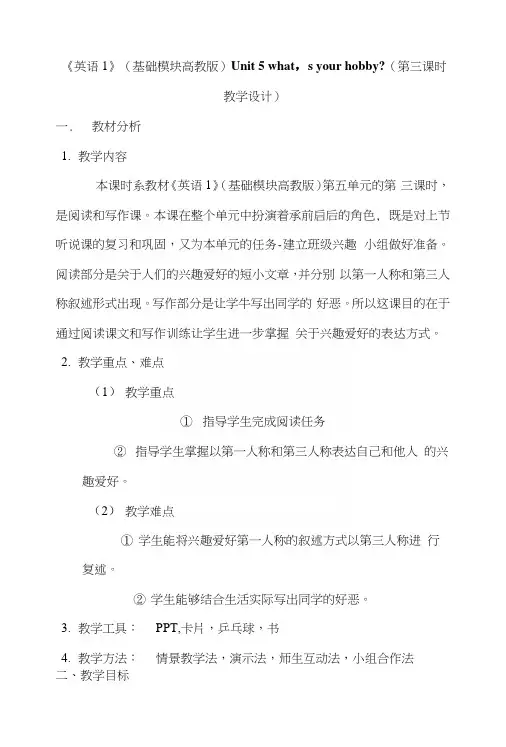
《英语1》(基础模块高教版)Unit 5 what,s your hobby?(第三课时教学设计)一.教材分析1.教学内容本课时系教材《英语1》(基础模块高教版)第五单元的第三课时,是阅读和写作课。
本课在整个单元中扮演着承前启后的角色, 既是对上节听说课的复习和巩固,又为本单元的任务-建立班级兴趣小组做好准备。
阅读部分是关于人们的兴趣爱好的短小文章,并分别以第一人称和第三人称叙述形式出现。
写作部分是让学牛写出同学的好恶。
所以这课目的在于通过阅读课文和写作训练让学生进一步掌握关于兴趣爱好的表达方式。
2.教学重点、难点(1)教学重点①指导学生完成阅读任务②指导学生掌握以第一人称和第三人称表达自己和他人的兴趣爱好。
(2)教学难点①学生能将兴趣爱好第一人称的叙述方式以第三人称进行复述。
②学生能够结合生活实际写出同学的好恶。
3.教学工具:PPT,卡片,乒乓球,书4.教学方法:情景教学法,演示法,师生互动法,小组合作法二、教学目标1.知识目标(1)学生能掌握和运用表达兴趣爱好的词汇和短语,如hate, favorite,exciting, boring hate doing sth 等。
(2 )学生能理解和运用表达兴趣爱好的第一人称和第三人称的句型。
如:I enjoy playing computer games・What's his hobby?He /She likes …,but he/ she doesn't like…He/ She enjoys..., but he/ she doesn't enjoy...He/ She loves ・・・,but he/ she hates・・・2.能力目标(1)学生能够读懂关于兴趣爱好的阅读材料。
(2)学生能够简单介绍自己的个人爱好以及其他人的兴趣爱好。
3.情感目标(1)学生能够积极与他人合作,有积极的学习态度(2)尊重他人的兴趣爱好。
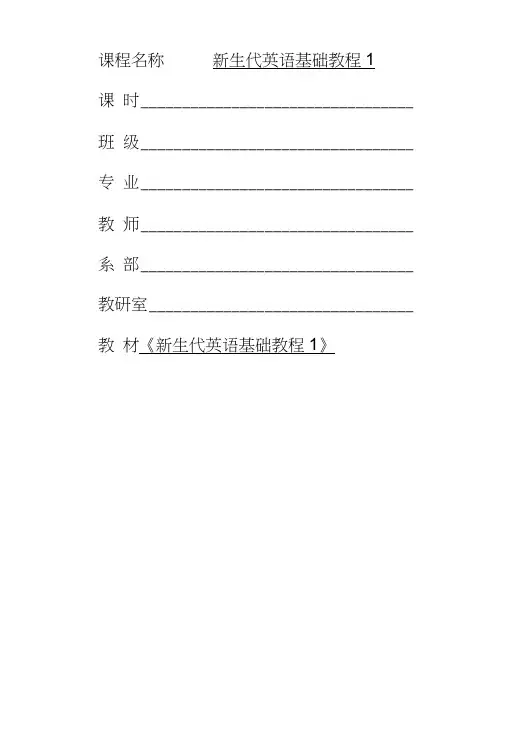
课程名称新生代英语基础教程1课时_________________________________ 班级_________________________________ 专业_________________________________ 教师_________________________________ 系部_________________________________ 教研室________________________________ 教材《新生代英语基础教程1》补充教学资源VOCABULARY BUILDERA 参考译文SHOW TIME>语言解析1.You'll get used to it pretty soon. 你很快会习惯这儿的。
get used to习惯,适应e.g. I have got used to working on challenging tasks.我已经习惯做有挑战性的工作了。
2.We take the Number 3 to Glendale Community College.我们坐3路车到格兰岱尔社区大学。
1)community college 社区大学e.g. My mum went to a community college to learn ikebana after her retirement. 我妈妈退休后,去社区大学学习插花。
2)take the No...乘……路车(公交车)e.g・You can take the No. 6 to the amusement park.你可以乘6路车去游乐园。
3.First we take the Number 11, get off at the Galleria Mall...首先,我们乘11路公交车,在加乐利亚购物中心下车……get off下车e.g. The bus driver got the passengers off in time.公共汽车司机让乘客及时下了车。


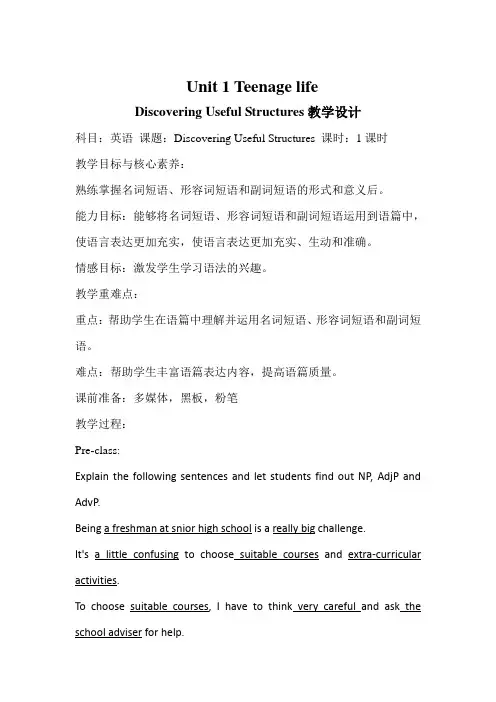
Unit 1 Teenage lifeDiscovering Useful Structures教学设计科目:英语课题:Discovering Useful Structures 课时:1课时教学目标与核心素养:熟练掌握名词短语、形容词短语和副词短语的形式和意义后。
能力目标:能够将名词短语、形容词短语和副词短语运用到语篇中,使语言表达更加充实,使语言表达更加充实、生动和准确。
情感目标:激发学生学习语法的兴趣。
教学重难点:重点:帮助学生在语篇中理解并运用名词短语、形容词短语和副词短语。
难点:帮助学生丰富语篇表达内容,提高语篇质量。
课前准备:多媒体,黑板,粉笔教学过程:Pre-class:Explain the following sentences and let students find out NP, AdjP and AdvP.Being a freshman at snior high school is a really big challenge.It's a little confusing to choose suitable courses and extra-curricular activities.To choose suitable courses, I have to think very careful and ask the school adviser for help.My adviser recommended that I should sign up for advanced literature. As to extra-curricular activities, I won' quit football and I will find a way to improve so that I can make the team.I have to study harder and be responsible for a lot more.I'm a bit worried about keeping up with the other students in my advanced course.While- class:Guide students to finish Activity 1 and 2 and correct answers.let students look at the given examples, then discuss in a group that how to improve their writing by adding more details and information through the use of noun phrases, adjective phrases, and adverb phrases.After- class:Guide students to finish practices of Activities 3,4 and 5.homework:语法填空Jim was a shy boy. He was afraid of talking to 1 (strange). As a result, he didn't have any friends after he entered high schoolOne day, when Jim 2 ( walk)on his way back home from school, it suddenly began to rain 3 (heavy). He saw a boy walking in front of him. The road was so wet that 4 boy slipped(滑倒)and fell on the ground. Jim quickly ran to the boy and helped 5 (he) get up.The boy was wet all over. Jim 6 (think) the boy must feel cold, so heasked the boy where he lived. When Jim 7 (tell) about the address, he found it was a bit far from there. Jim lived nearby,8 he invited the boy to his home.After they arrived, Jim gave him some clean clothes and asked him to get changed. The boy was so grateful 9 Jim that he thanked Jim again and againThe following day, the boy saw Jim at school. He thanked Jim again for 10 (help) him out. From then on, they often spent time together and became best friends.答案1.strangers2.was walking3.heavily4.the5.him6.thought7.was told8.so9.to10.helpingUnit 1 Listening and SpeakingListening and Speaking教学设计科目:英语课题:Reading and Thinking 课时:1课时教学目标与核心素养:知识目标:理解听力文本内容能力目标:掌握听前预测技能情感目标:能根据自己的喜好选择适合自己的社团,并培养相关兴趣。
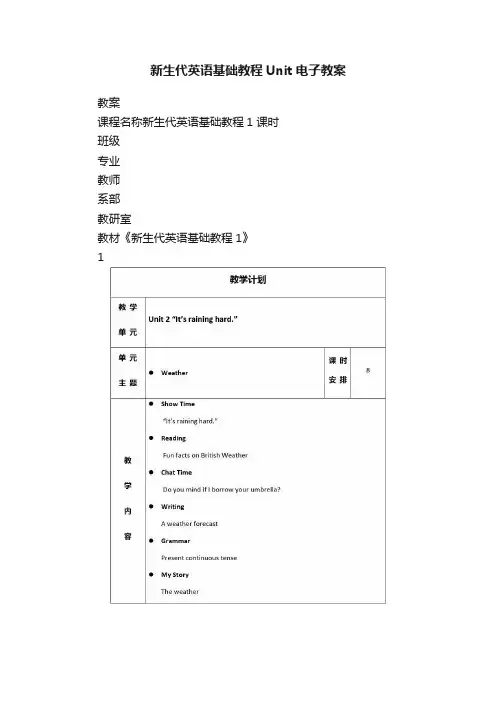
新生代英语基础教程Unit电子教案教案课程名称新生代英语基础教程1 课时班级专业教师系部教研室教材《新生代英语基础教程1》1345678补充教学资源VOCABULARY BUILDER参考译文SHOW TIME语言解析1. It’s ten after three.三点过十分了。
ten after three 三点过十分,这个短语相当于ten past three。
英语中表示“几点过几分”(半小时以内)可用after,也可用past;而表示“几点差几分”则用to,通常先讲分钟,再讲小时, 即after / past 或to前面的数字为分钟,后面的数字为小时。
e.g. 5:10 ten past five (ten after five)10:05 five past ten (five after ten)5:50 ten to six9:45 fifteen to ten2. The class is canceled because of the storm. 因为暴雨,课被取消了。
because of意思是“因为”,是一个介词短语,后面跟名词或动名词,构成介宾结构。
because是连词,后面跟句子。
9e.g. The plane didn’t take off because of the heavy rain.因为大雨,飞机没有起飞。
The plane didn’t take off because it was raining heavily.因为下大雨,飞机没有起飞。
3.Nobody came to class—except us.除了我们几个,没有人来上课了。
except 表示“除……之外”,强调所排除的“不包括在内”,一般表示同类之间的关系。
besides表示“除……以外还……”,有“不但……而且……”的意思。
e.g. The library is open every day except Mondays.除了星期一,图书馆每天都开放。
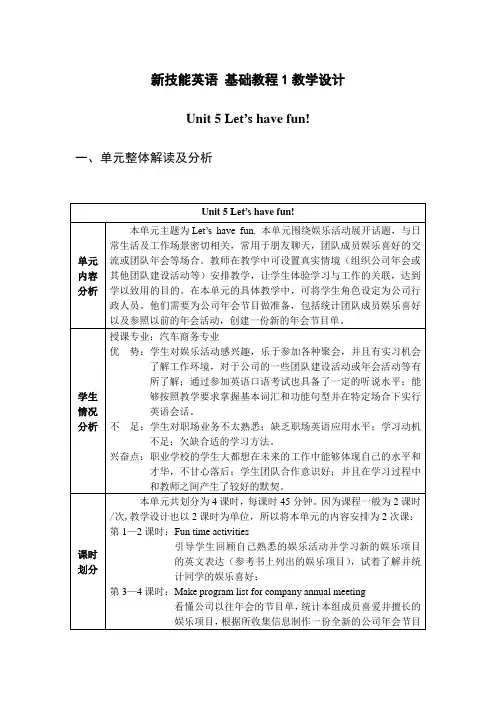
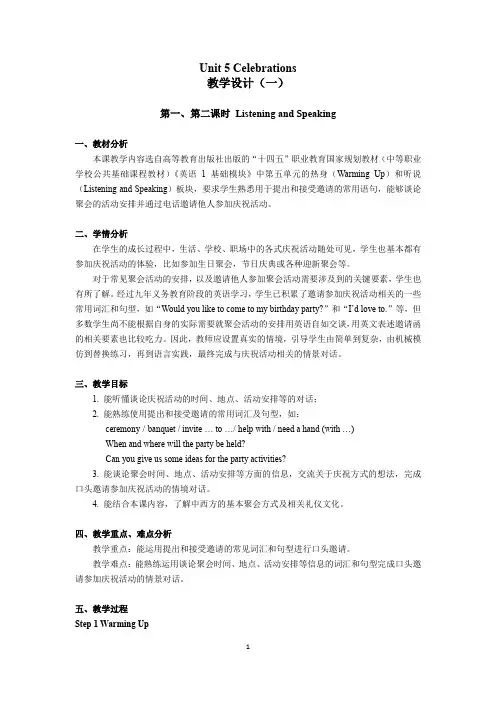
Unit 5 Celebrations教学设计(一)第一、第二课时Listening and Speaking一、教材分析本课教学内容选自高等教育出版社出版的“十四五”职业教育国家规划教材(中等职业学校公共基础课程教材)《英语 1 基础模块》中第五单元的热身(Warming Up)和听说(Listening and Speaking)板块,要求学生熟悉用于提出和接受邀请的常用语句,能够谈论聚会的活动安排并通过电话邀请他人参加庆祝活动。
二、学情分析在学生的成长过程中,生活、学校、职场中的各式庆祝活动随处可见,学生也基本都有参加庆祝活动的体验,比如参加生日聚会,节日庆典或各种迎新聚会等。
对于常见聚会活动的安排,以及邀请他人参加聚会活动需要涉及到的关键要素,学生也有所了解。
经过九年义务教育阶段的英语学习,学生已积累了邀请参加庆祝活动相关的一些常用词汇和句型,如“Would you like to come to my birthday party?”和“I’d love to.”等,但多数学生尚不能根据自身的实际需要就聚会活动的安排用英语自如交谈,用英文表述邀请函的相关要素也比较吃力。
因此,教师应设置真实的情境,引导学生由简单到复杂,由机械模仿到替换练习,再到语言实践,最终完成与庆祝活动相关的情景对话。
三、教学目标1. 能听懂谈论庆祝活动的时间、地点、活动安排等的对话;2. 能熟练使用提出和接受邀请的常用词汇及句型,如:ceremony / banquet / invite … to …/help with / need a hand (with …)When and where will the party be held?Can you give us some ideas for the party activities?3. 能谈论聚会时间、地点、活动安排等方面的信息,交流关于庆祝方式的想法,完成口头邀请参加庆祝活动的情境对话。
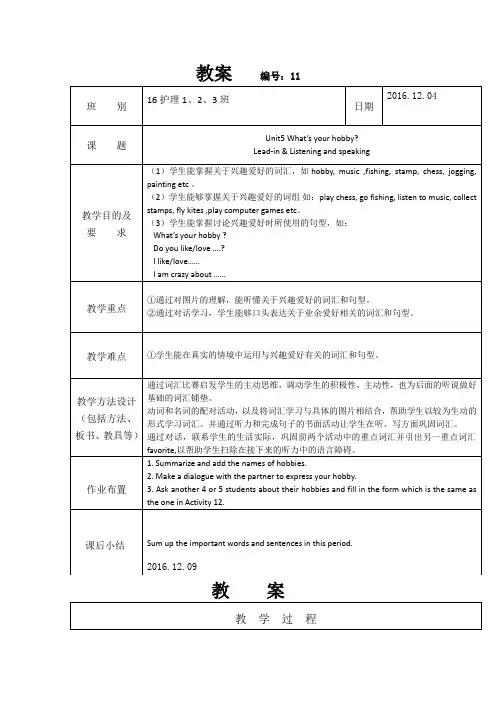
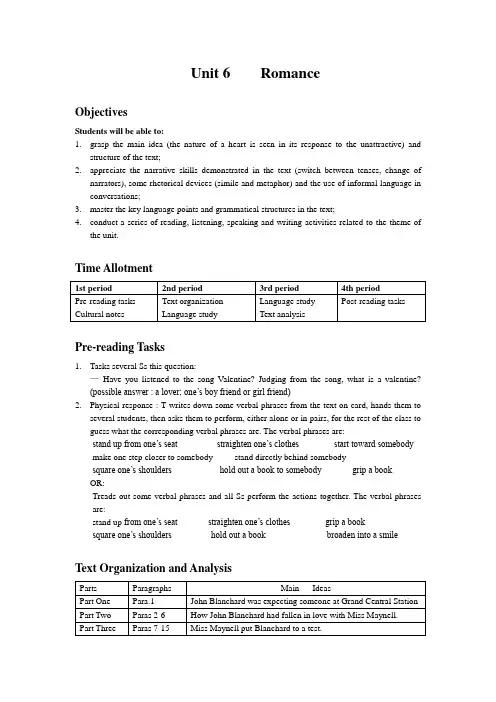
Unit 6 RomanceObjectivesStudents will be able to:1.grasp the main idea (the nature of a heart is seen in its response to the unattractive) andstructure of the text;2.appreciate the narrative skills demonstrated in the text (switch between tenses, change ofnarrators), some rhetorical devices (simile and metaphor) and the use of informal language in conversations;3.master the key language points and grammatical structures in the text;4.conduct a series of reading, listening, speaking and writing activities related to the theme ofthe unit.Time AllotmentPre-reading Tasks1.Tasks several Ss this question:—Have you listened to the song Valentine? Judging from the song, what is a valentine?(possible answer : a lover; one’s boy friend or girl friend)2.Physical response : T writes down some verbal phrases from the text on card, hands them toseveral students, then asks them to perform, either alone or in pairs, for the rest of the class to guess what the corresponding verbal phrases are. The verbal phrases are:stand up from one’s seat straighten one’s clothes start toward somebody make one step closer to somebody stand directly behind somebodysquare one’s shoulders hold out a book to somebody grip a bookOR:Treads out some verbal phrases and all Ss perform the actions together. The verbal phrases are:stand up from one’s seat straighten one’s clothes grip a booksquare one’s shoulders hold out a book broaden into a smile Text Organization and AnalysisIn this text there are some examples of simile and metaphor. A simile is a comparison of one thing to another, using the words “like” or “as”, e.g., “her hair was black as night”; “in her green suit she was like springtime come alive” (Para. 7). A metaphor is a sugge sted but not stated comparison of one thing to another, e.g., “while I spoke I felt choked by the bitterness of my disappointment” (Para. 14).Notice also that the characters talk in a rather informal way. For example, “Going my way, sailor?” is an incompl ete sentence. Or see how the middle-aged woman spoke in Para. 15—“son”, “go and tell”, “some kind of ” and so on are all casual.Cultural NotesPublic libraries in the U.S.: public libraries in the U.S. are free to the public. One can get a library card at the local library by filling in a form and showing the librarian a valid ID and something to prove that one lives in the neighborhood (e.g., a used and stamped envelope with one’s name as the addressee, one’s phone bill, gas bill, etc.). Besides borrowi ng books, people go to libraries to borrow video tapes, use the computers there, attend book readings by authors and other cultural events. Libraries are regarded as community centers.Language Study1.straighten v.: (cause to) become straight or level or tidy (使)变直;(使)变平整e.g. He straightened the bent wire.The road straightened out here.straighten out (1)变直;把…弄直(2)克服,解决(困难)e.g. I don’t know how to straighten the mess out. 我不知道该如何收拾这个烂摊子。
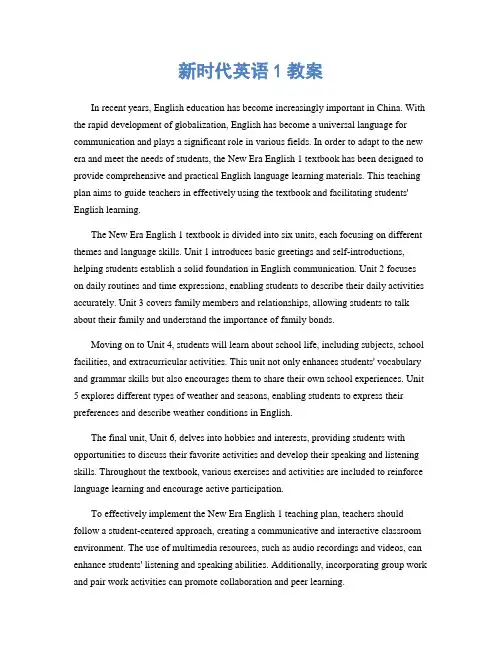
新时代英语1教案In recent years, English education has become increasingly important in China. With the rapid development of globalization, English has become a universal language for communication and plays a significant role in various fields. In order to adapt to the new era and meet the needs of students, the New Era English 1 textbook has been designed to provide comprehensive and practical English language learning materials. This teaching plan aims to guide teachers in effectively using the textbook and facilitating students' English learning.The New Era English 1 textbook is divided into six units, each focusing on different themes and language skills. Unit 1 introduces basic greetings and self-introductions, helping students establish a solid foundation in English communication. Unit 2 focuses on daily routines and time expressions, enabling students to describe their daily activities accurately. Unit 3 covers family members and relationships, allowing students to talk about their family and understand the importance of family bonds.Moving on to Unit 4, students will learn about school life, including subjects, school facilities, and extracurricular activities. This unit not only enhances students' vocabulary and grammar skills but also encourages them to share their own school experiences. Unit 5 explores different types of weather and seasons, enabling students to express their preferences and describe weather conditions in English.The final unit, Unit 6, delves into hobbies and interests, providing students with opportunities to discuss their favorite activities and develop their speaking and listening skills. Throughout the textbook, various exercises and activities are included to reinforce language learning and encourage active participation.To effectively implement the New Era English 1 teaching plan, teachers should follow a student-centered approach, creating a communicative and interactive classroom environment. The use of multimedia resources, such as audio recordings and videos, can enhance students' listening and speaking abilities. Additionally, incorporating group work and pair work activities can promote collaboration and peer learning.In terms of assessment, teachers can adopt a variety of methods, including quizzes, presentations, and role-plays, to evaluate students' language proficiency. Regular feedback and individualized guidance should also be provided to help students identify their strengths and weaknesses and make progress in their English learning journey.In conclusion, the New Era English 1 textbook provides a comprehensive and engaging English language learning experience for students. By following the teaching plan and implementing effective teaching strategies, teachers can create an interactive and communicative classroom environment that fosters students' language skills development. With the continuous improvement of English education in China, students will be better equipped to communicate and thrive in the globalized world.。
教案本教师姓名:授课班级:1722、1723、1712课程名称:新模式英语1教案编号:版本:流水号:授课教师:审阅签名:提交日期:2018.03.05 审阅日期:教学过程编号:版本:流水号:授课教师:审阅签名:提交日期:2018.03.05 审阅日期:教学过程教案编号:版本:流水号:授课教师:审阅签名:提交日期:2018.03.05 审阅日期:教学过程教案编号:版本:流水号:授课教师:审阅签名:提交日期:2018.03.05 审阅日期:教学过程教案编号:版本:流水号:授课教师:审阅签名:提交日期:2018.04.05 审阅日期:教学过程教案编号:版本:流水号:授课教师:审阅签名:提交日期:2018.04.05 审阅日期:教学过程教案编号:版本:流水号:授课教师:审阅签名:提交日期:2018.04.05 审阅日期:教学过程教案编号:版本:流水号:授课教师:金瑞亮审阅签名:提交日期:2018.04.05 审阅日期:教学过程编号:版本:流水号:授课教师:审阅签名:提交日期:2018.05.05 审阅日期:编号:版本:流水号:授课教师:审阅签名:提交日期:2018.05.05 审阅日期:编号:版本:流水号:授课教师:审阅签名:提交日期:2018.05.05 审阅日期:编号:版本:流水号:授课教师:审阅签名:提交日期:2018.05.05 审阅日期:编号:版本:流水号:授课教师:审阅签名:提交日期:2018.05.05 审阅日期:编号:版本:流水号:授课教师:金瑞亮审阅签名:提交日期:2018.06.05 审阅日期:编号:版本:流水号:授课教师:金瑞亮审阅签名:提交日期:2018.06.05 审阅日期:编号:版本:流水号:授课教师:金瑞亮审阅签名:提交日期:2018.06.05 审阅日期:编号:版本:流水号:授课教师:金瑞亮审阅签名:提交日期:2018.06.05 审阅日期:编号:版本:流水号:授课教师:金瑞亮审阅签名:提交日期:2018.06.05 审阅日期:教案编号:版本:流水号:授课教师:金瑞亮审阅签名:提交日期:2018.06.05 审阅日期:教学过程。
大学英语1课程教案Unit 1 Starting OutTeaching Content:Diary of AFresherLesson Type: Intensive Reading (New StandardCollege English Book 1)Total Time:4。
5 HoursClass/Object:Freshman (the first term)Teaching Procedures:Step 1Starting Point(15mins)1. What do you expect to learn in the university?2。
Work in pairs。
Look at the photo of a university. Choose words to describe it。
And then think of words to describe your own college.3. Work in pairs。
Brainstorm college education objectives and what are important to you.☐finding a girlfriend / boyfriend☐studying hard and learning a lot☐meeting people and making friends☐getting a good job when you graduate☐having fun☐growing up and becoming independent☐going to parties☐doing lots of sport☐reading widely☐learning new skills and having new experiencesStep 2Introductory remarks(10mins)How to write a diary in English1. Format:a. Write down the date, the day and the weather on the first line. The date and the day areon the left,while the weather is on the right.b。
教案课程名称新时代职业英语通用英语1课时班级专业教师系部教研室教材《新时代职业英语通用英语1》123456789101112补充教学资源Vocabulary Focus参考译文本:怎么了?你看起来忧心忡忡的?李青:我今天去自动提款机取钱。
我觉得有人从我的账户里取了钱。
本:真的吗?你为什么会这么想?李清:是这样,昨天有一笔500美元的取款,但是我昨天一天都在家里。
本:你最好马上告知银行,这样他们就能冻结你的账户。
李清:天哪!你觉得我能找回被偷的钱吗?本:我也不确定。
但如果你现在给银行打电话,你就能阻止更多的钱被偷。
李清:谢谢你,本。
解决这件事就宽心了。
Reading参考译文五种最常见的网络犯罪——摘自安娜的帖子在数字时代,越来越多的犯罪是通过电脑进行的。
最常见的网络犯罪有哪些呢?让我们一起来看一看吧。
钓鱼式欺诈。
钓鱼网站看起来似乎是普通的合法网站,但其实却是一个精心设计的虚假网站。
犯罪分子利用这些钓鱼网站获取用户的个人信息。
通过钓鱼,黑客诱骗用户在虚假网页上输入自己的银行密码或家庭住址。
盗用身份信息。
你是否点开过群发的垃圾邮件或是陌生人发来的链接?如果你有过类似的经历,那么你的身份信息很可能已经被盗用了。
网络犯罪分子常常使用盗用的信用卡或银行信息,以受害者的名义进行购物。
13网络骚扰。
如果你使用诸如微信或微博一类的网络社交平台,那么你可能注意到了身边发生的网络骚扰行为。
它可能是通过网络社交平台或电子邮件发送的威胁或谩骂。
网络跟踪。
网络跟踪者试图追踪受害人的一切网络活动。
在某些极端的案例中,他们可能通过恶意软件控制对方的电脑,因为这些恶意软件可以记录电脑中的所有活动。
他们还可能会骚扰其受害人。
侵犯隐私。
侵犯隐私的行为包括入侵对方的电脑、阅读对方的电子邮件或监视其网络活动。
在现行法律下,很多此类犯罪都构成了违法行为。
那么如何避免成为网络犯罪的受害者呢?其中很重要的一点是要保持警惕。
牢记这五种常见的网络犯罪行为可以让你免受些经济损失或骚扰。
教案
课程名称新生代英语基础教程1 课时
班级
专业
教师
系部
教研室
教材《新生代英语基础教程1》
补充教学资源VOCABULARY BUILDER
SHOW TIME
➢语言解析
1. You’ll get used to it pretty soon.你很快会习惯这儿的。
get used to习惯,适应
e.g. I have got used to working on challenging tasks.
我已经习惯做有挑战性的工作了。
2. We take the Number 3 to Glendale Community College.
我们坐3路车到格兰岱尔社区大学。
1) community college社区大学
e.g. My mum went to a community college to learn ikebana after her retirement.
我妈妈退休后,去社区大学学习插花。
2) take the No…乘……路车(公交车)
e.g. You can take the No. 6 to the amusement park.
你可以乘6路车去游乐园。
3. First we take the Number 11, get off at the Galleria Mall…
首先,我们乘11路公交车,在加乐利亚购物中心下车……
get off 下车
e.g. The bus driver got the passengers off in time.
公共汽车司机让乘客及时下了车。
4. What a coincidence! 真巧啊!
coincidence 一致;巧合
e.g. By coincidence, his wife is one of my classmates in college.
巧合的是,他的妻子是我的大学同学。
It was no coincidence that his car was seen near the bank at the time of the robbery.
劫案发生时有人看见他的车停在银行附近,这绝非巧合。
5. I’m still learning the schedule. 我还在熟悉时刻表。
schedule 时刻表
e.g. The flight arrived two minutes ahead of schedule.
航班比预定时间早两分钟到达。
娜奥米:但愿如此,你这要去哪儿?
赫克托:我乘公交去学校。
娜奥米:哦,我也是。
赫克托:太好了,我们一起吧。
娜奥米:我们得乘几路公交车?
赫克托:来,我指给你看。
我们现在在这儿,看到了吗?
娜奥米:医院边上?
赫克托:是的。
我们先乘11路车,在加乐利亚购物中心下车,然后转乘3路车到达格兰岱尔社区大学,就是这么简单。
娜奥米:先坐11路到购物中心,然后3路车到学校……那11路车什么时候来?
赫克托:下一班车是11:50,应该随时就会来。
我想我看到11路车了。
娜奥米:来啦。
那个,你昨晚做作业了吗……
(2)
娜奥米:嘿,赫克托,真巧,你是要坐公交去学校?
赫克托:是啊,我要坐11路车。
娜奥米:等等,让我来说。
我们先乘11路车到购物中心,然后转乘3路车到学校。
赫克托:啊哈,你现在是专家啦。
娜奥米:但我对班车时刻表还不太熟。
购物广场出发的3路车多长时间一班?
赫克托:每隔20分钟,12:15有一班。
娜奥米:现在都12:20了,我觉得我们错过了那一班。
哎呀,下一班12:35到这里。
赫克托:看看,我说对了吧。
你现在都成专家了。
(3)
路人:打扰一下,请问你知道怎么去加乐利亚购物中心吗?
READING
➢背景知识
➢语言解析
1. San Francisco is easy to get around. 在旧金山,出行很方便。
get around 四处走动,出行
e.g. His new wheelchair lets him get around more easily.
新轮椅让他行动起来更容易。
2.Here are some of the best ways I recommend you to see this beautiful city. 我向您推荐一些游览这座美丽城市的最佳方式。
recommend推荐
e.g. I recommend that you inquire about the job. 我建议你了解一下这项工作。
3. Many of the city’s most popular tourist destinations are within walking distance of each other.
城市中许多最受欢迎的旅游景点在之间可步行到达。
within walking distance 步行可至
e.g. Your firm is quite near my home—within walking distance.
你的公司离我家很近,走一段路就到了。
4. Tired of walking? 厌倦走路?
tired of厌倦
e.g. We were tired of waiting for him to call. 我们等他打电话来都等烦了。
5.You can get them at taxi stands or book them over the phone.
你能在出租车停靠站打到车,或者可以打电话叫车。
taxi stand出租车停靠站
e.g. He is walking toward a taxi stand. 他朝着出租车停靠站走去。
MORE NOTE
CHAT TIME
MY STORY。